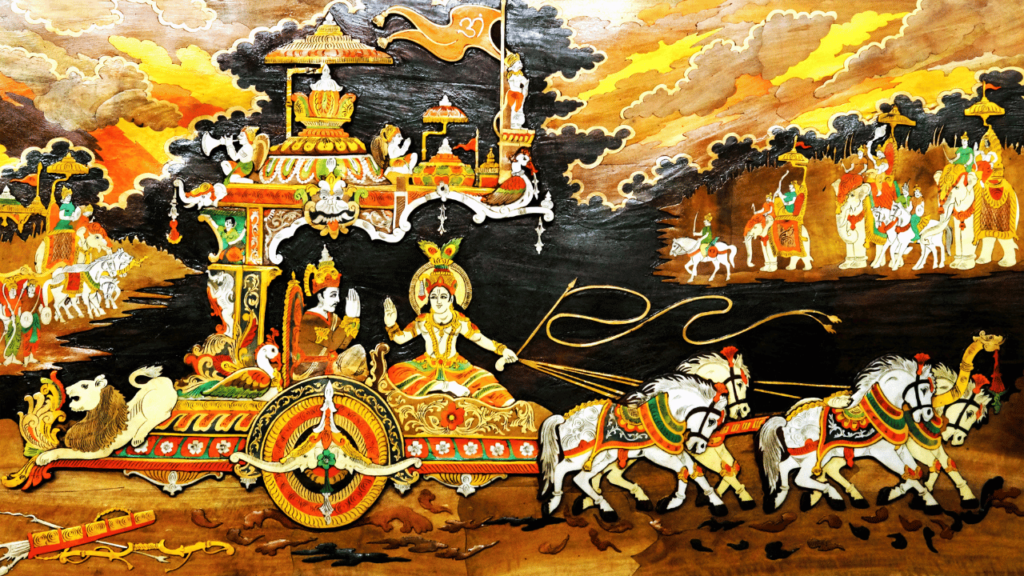
Bhagavad Gita, one of the most revered scriptures of Hinduism, is a spiritual guidebook that offers timeless wisdom and practical advice on how to live a fulfilling life. Its teachings are still relevant and continue to inspire people all over the world. In this blog, we will explore some of the most powerful shlokas from Bhagavad Gita that have the potential to transform your life forever. These shlokas provide a profound understanding of the nature of existence and offer a path to self-realization, inner peace, and spiritual growth.
Today, the world is more connected and fast-paced than ever before, with countless distractions vying for our attention. The constant barrage of information, stress, and pressure can easily leave us feeling overwhelmed, anxious, and uncertain about the future. In such times, it is more essential than ever to stay motivated and happy. Maintaining a positive outlook not only improves our mental health but also helps us navigate through challenging times with greater resilience and creativity. By staying motivated, we can stay focused on our goals and aspirations, overcome obstacles, and achieve success in all areas of our lives. The teachings of Bhagavad Gita’s shlokas offer timeless wisdom that can help us cultivate a positive mindset and find meaning and purpose in life. By incorporating these teachings into our daily lives, we can unlock our full potential and lead fulfilling and meaningful life.
Here are some shlokas from the Bhagavad Gita that can inspire and transform your life:
“Karmanyevadhikaraste ma phaleshu kadachana”
(Chapter 2, Verse 47) –
This shloka means “You have the right to work, but never to the fruits of the work”. It emphasizes the importance of focusing on the present moment and doing one’s duty without being attached to the outcome.
“Yoga-sthah kuru karmani sangam tyaktva dhananjaya”
(Chapter 2, Verse 48) –
This shloka means “Perform your duty equipoised, O Arjuna, abandoning all attachment to success or failure. Such evenness of mind is called Yoga.” It emphasizes the importance of staying balanced and centered in the midst of life’s ups and downs.
“Tasmat sarveshu kaleshu ma manusmara yudhya cha”
(Chapter 8, Verse 7) –
This shloka means “Therefore, at all times, remember Me and fight”. It reminds us to always stay connected to our higher self and fight for what is right, even in difficult times.
“Sarva-dharman parityajya mam ekam sharanam vraja”
(Chapter 18, Verse 66) –
This shloka means “Abandon all varieties of religion and just surrender unto Me. I shall deliver you from all sinful reactions. Do not fear”. It emphasizes the importance of surrendering to a higher power and having faith in its guidance.
“Man-mana bhava mad-bhakto mad-yaji mam namaskuru”
(Chapter 18, Verse 65) –
This shloka means “Always think of Me, become My devotee, worship Me and offer your homage unto Me”. It emphasizes the importance of cultivating a spiritual connection with the divine and living a life of devotion.
“Vasamsi jirnani yatha vihaya navani grhnati naro ‘parani tatha sarirani vihaya jirnany anyani samyati navani dehi”
(Chapter 2, Verse 22) –
This shloka means “As a person puts on new garments, giving up old ones, the soul similarly accepts new material bodies, giving up the old and useless ones”. It reminds us that we are not our physical bodies but rather eternal souls and that we should focus on our spiritual growth.
“Na hi kalyana-krt kascid durgatim tata gacchati”
(Chapter 6, Verse 40) –
This shloka means “No one who does good work will ever come to a bad end, either here or in the world to come”. It emphasizes the importance of doing good deeds and living a virtuous life.
“Dhyana-yogena sankhyena karma-yogena yoginam svabhava-jena kaunteya nibaddhah svena karmana”
(Chapter 3, Verse 3) –
This shloka means “The wise men, engaged in devotional service, take refuge in the knowledge, and those who perform sacrifice with their work, they also take refuge in the knowledge. O son of Kunti, all activities are dependent on the nature of the doer”. It highlights the importance of self-knowledge, devotion, and doing our duty in accordance with our nature.
“Sreyan svadharmo vigunah paradharmat svanusthitat sreyah paradharmo bhavah”
(Chapter 3, Verse 35) –
This shloka means “It is better to perform one’s own duty imperfectly than to master the duty of another. By fulfilling the obligations born of one’s nature, one never incurs sin”. It reminds us to stay true to our own path and not get distracted by the path of others.
“Jnana-vijnana-trptatma kuta-stho vijitendriyah yukta ity ucyate yogi samaloshta-ashma-kancanah”
(Chapter 6, Verse 8) –
This shloka means “A person is said to be elevated in yoga when being fully satisfied by knowledge and realization, they remain steadfastly fixed in the Supreme Self, with senses under control and free from attraction and aversion, alike in success and failure”. It emphasizes the importance of remaining detached and equanimous in all situations and finding satisfaction in spiritual knowledge and realization.

